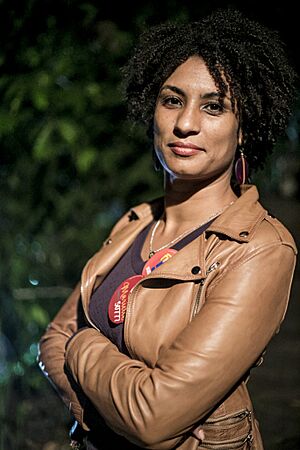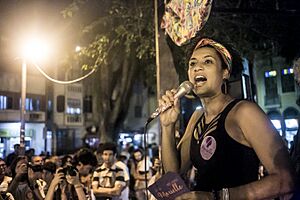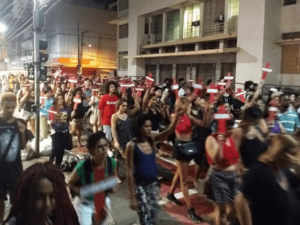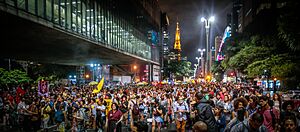Marielle Franco facts for kids
Quick facts for kids
Marielle Franco
|
|
|---|---|

Franco in 2016
|
|
| Councillor of Rio de Janeiro | |
| In office 1 January 2017 – 14 March 2018 |
|
| Affiliation | PSOL |
| Constituency | At-large |
| Personal details | |
| Born |
Marielle Francisco da Silva
27 July 1979 Rio de Janeiro, Brazil |
| Died | 14 March 2018 (aged 38) Rio de Janeiro, Brazil |
| Cause of death | Assassination |
| Political party | PSOL (2007–2018) |
| Domestic partners | Mônica Benício (2004–2018; her death) |
| Relations | Anielle Franco (sister) |
| Children | 1 |
| Alma mater | Pontifical Catholic University of Rio de Janeiro Fluminense Federal University |
| Occupation | Politician, sociologist |
Marielle Franco (born Marielle Francisco da Silva, 27 July 1979 – 14 March 2018) was a Brazilian politician and human rights activist. She was also a sociologist, which means she studied how societies work. Marielle was known for supporting feminism, which is about equal rights for women.
She served as a city councillor for Rio de Janeiro from January 2017 until her tragic death in March 2018. As a councillor, she worked to represent and help the people of her city.
On 14 March 2018, Marielle and her driver were killed while in a car after she gave a speech. Marielle had often spoken out against police brutality and unfair killings. She also criticized the government's decision to send the army to help with police work in Rio de Janeiro. In March 2019, two former police officers were arrested in connection with her death.
Contents
Marielle Franco's Early Life
Marielle grew up in Maré, a community in northern Rio de Janeiro. She lived there for most of her life. From a young age, she started working to help her family.
She had a sister named Anielle Franco. When Marielle was 19, she had her daughter, Luyara. Marielle raised her daughter while working as a pre-school teacher.
Her Education and Studies
In 2000, Marielle began preparing for university. After a friend died from a stray bullet that same year, she became passionate about human rights.
In 2002, she received a scholarship to attend the Pontifical Catholic University of Rio de Janeiro. She continued to work and raise her daughter while studying social sciences. Later, she earned a master's degree in public administration. Her master's paper was about a police program in Rio's communities.
Marielle's Political Journey
Starting in 2007, Marielle worked as an advisor for a state representative named Marcelo Freixo. She helped lead a committee that worked to protect human rights. She also worked with groups that help communities.
In 2016, Marielle ran for a seat on the Rio de Janeiro city council. As a Black woman and a single mother from a less privileged community, she aimed to represent poor Black women and people from similar areas. She received over 46,500 votes, making her one of the top elected councillors.
As a city council member, Marielle fought against violence towards women. She also supported women's rights and the rights of people living in communities like Maré. She led the Women's Defense Commission.
Her Fight for Justice and Tragic Death
On 13 March 2018, Marielle spoke out on Twitter about police violence. She wrote about a young man who was killed and asked, "How many others will have to die for this war to end?"
The next day, Marielle attended a discussion about young Black women in leadership. Less than two hours after leaving, she and her driver, Anderson Pedro Gomes, were killed by two men in another car. Police believe the shots were aimed at Marielle, suggesting it was a planned attack.
The bullets used were from a batch bought by the federal police in 2006. In March 2019, police arrested two suspects who were former military police officers. These suspects were reportedly linked to a vigilante group.
Reactions to Her Death

Thousands of people protested across Brazil after Marielle's death. Groups like Amnesty International and Human Rights Watch spoke out against her killing. In the United States, Black feminist scholars honored Marielle as a "martyr" for the Movement for Black Lives.
Journalist Glenn Greenwald said that Marielle's activism was important. He highlighted her brave work against unfair police actions and her opposition to military involvement. He also noted her growing influence as a Black woman from a less privileged community who wanted to change Brazil's power structure.
Many politicians in Brazil condemned the crime. In 2022, President Lula appointed Marielle's sister, Anielle Franco, as Minister of Racial Equality.
Her Lasting Impact
A digital art workshop called "Portraits of Marielle" was held in Kenya. Young Kenyan artists created artworks that were later shown in Rio de Janeiro. This helped connect people in Kenya and Brazil.
Amnesty International included Marielle's name in its campaign for human rights writers who lost their lives. An online tribute also listed her among over 400 women who advocate for human rights.
A documentary series about Marielle, called Marielle – O Documentário, was released in 2020. A version of the Linux distribution antiX was also named after Marielle Franco.
Images for kids
See also
- List of assassinations § Brazil
 | Claudette Colvin |
 | Myrlie Evers-Williams |
 | Alberta Odell Jones |





